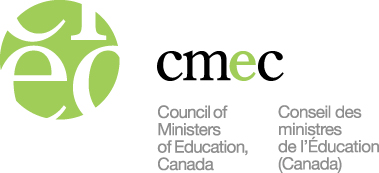This is the legacy site of the Council of Ministers of Education, Canada (CMEC).
It is slated to be discontinued in the coming months.
You are invited to visit and explore the new CMEC site at http://www.cmec.ca/.

This is the legacy site of the Council of Ministers of Education, Canada (CMEC). You are invited to visit and explore the new CMEC site at http://www.cmec.ca/. |
 |
The draft vision statement and the introductory section of the final document have been submitted to participating jurisdictions for approval in principle. The introductory section contains five foundation statements that will underlie the general and specific learning outcomes for science k-12. The vision statement and introductory section were submitted to participating jurisdictions for review by stakeholders, and have been revised as per the comments received. While specific wording may be modified over the course of the project, it is understood that, once participating jurisdictions have approved these elements in principle, the general intent and direction will not change. It is expected that all participating jurisdictions will have signed off in principle on the vision statement and introductory section by the end of June.
Meanwhile, anglophone and francophone teachers and members of the project team gathered in Victoria in mid-April to develop a first draft, in English and in French, of general learning outcomes for grades 3, 6, 9, and 12. The lead provinces (British Columbia and Manitoba francophone) were given the responsibility of developing this first draft of general learning outcomes with teachers from within their jurisdiction. However, it was agreed that Manitoba, as French-language lead jurisdiction, could call upon Ontario and New Brunswick to provide francophone teachers if necessary to ensure adequate francophone representation at the writing sessions. All participating jurisdictions will have the opportunity to review and comment on the material developed.
During the development process in Victoria, and in future development, the intent is to link each general outcome with the vision statement and, more specifically, with the foundation statements that underlie the project. Each general learning outcome (and by definition, each specific learning outcome), therefore, will ultimately refer back to one or more of the following areas: scientific knowledge; unifying scientific concepts; science, technology, society, and the environment; scientific strategies and/or skills; scientific attitudes.
A second writing session will be held in Winnipeg in mid-July to further refine the general learning outcomes and to fill any identified gaps. The teacher-writers and members of the project team will also begin to develop specific grade-by-grade learning outcomes that flow naturally from the general learning outcomes.
Over the course of the summer and in early fall, participating jurisdictions will also have the opportunity, if they so desire, to develop illustrative examples using the specific learning outcomes. These examples will suggest ways in which a teacher might approach some of the learning outcomes.
Some teacher-writers and the members of the project team will gather once again in mid-September to finalize the general and specific learning outcomes and, with the coordinators from the lead jurisdictions, begin to prepare the consultative draft document. In October and November of this year, each participating jurisdiction will undertake a process with its stakeholders to review the consultative draft prepared by the coordinators and the project team.
The next update will be made available on the CMEC home page in early October.
Last revised: 1996 07 31
|
||||
| © 2009 Council of Ministers of Education, Canada |